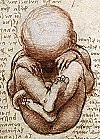
Back Baba Afrikaans رضيع Arabic مومو ARY Ñácaru AST Wawa Aymara Körpə Azerbaijani کؤرپه AZB Buzal BAR Umboy BCL Немаўля Byelorussian

| Part of a series on |
| Human growth and development |
|---|
 |
| Stages |
| Biological milestones |
| Development and psychology |
An infant or baby is the very young offspring of human beings. Infant (from the Latin word infans, meaning 'baby' or 'child'[1]) is a formal or specialised synonym for the common term baby. The terms may also be used to refer to juveniles of other organisms. A newborn is, in colloquial use, an infant who is only hours, days, or up to one month old. In medical contexts, a newborn or neonate (from Latin, neonatus, newborn) is an infant in the first 28 days after birth;[2] the term applies to premature, full term, and postmature infants.
Infants born prior to 37 weeks of gestation are called "premature",[3] those born between 39 and 40 weeks are "full term", those born through 41 weeks are "late term", and anything beyond 42 weeks is considered "post term".[4]
Before birth, the offspring is called a fetus. The term infant is typically applied to very young children under one year of age; however, definitions may vary and may include children up to two years of age. When a human child learns to walk, they are called a toddler instead.
- ^ "Charlton T. Lewis, An Elementary Latin Dictionary, īnfāns". www.perseus.tufts.edu. Archived from the original on 2023-04-23. Retrieved 2023-04-05.
- ^ "Neonate". Merriam-Webster online dictionary. Merriam-Webster. Archived from the original on 2007-03-11. Retrieved 2007-03-27.
- ^ Nöcker-Ribaupierre M (2015-06-01). "Originalbeiträge. Internationale musiktherapeutische Ansätze für frühgeborene Kinder/ International Music Therapy Approaches with premature Infants". Musiktherapeutische Umschau. 36 (2): 106–118. doi:10.13109/muum.2015.36.2.106. ISSN 0172-5505.
- ^ "Definition of Term Pregnancy". www.acog.org. Retrieved 2023-12-20.
© MMXXIII Rich X Search. We shall prevail. All rights reserved. Rich X Search